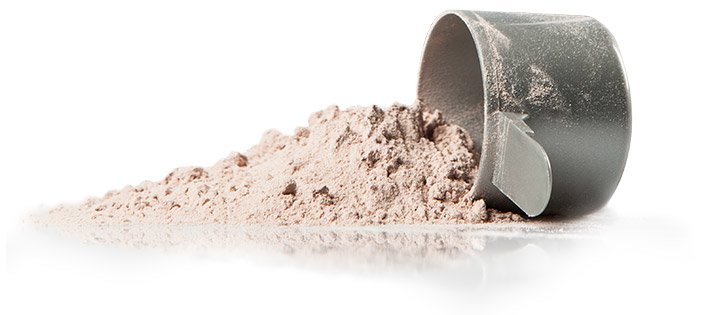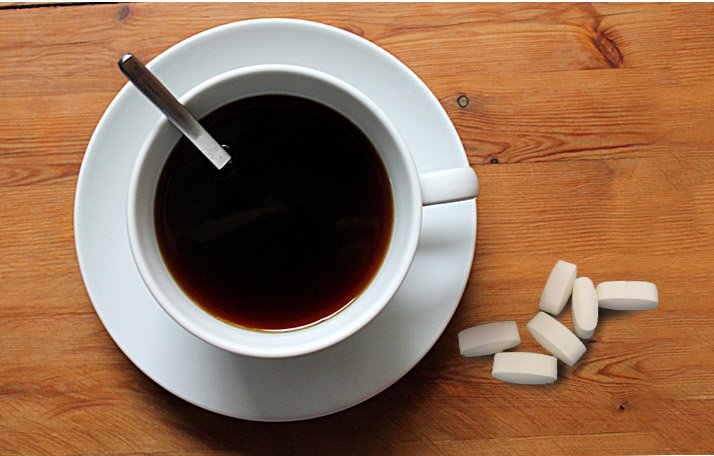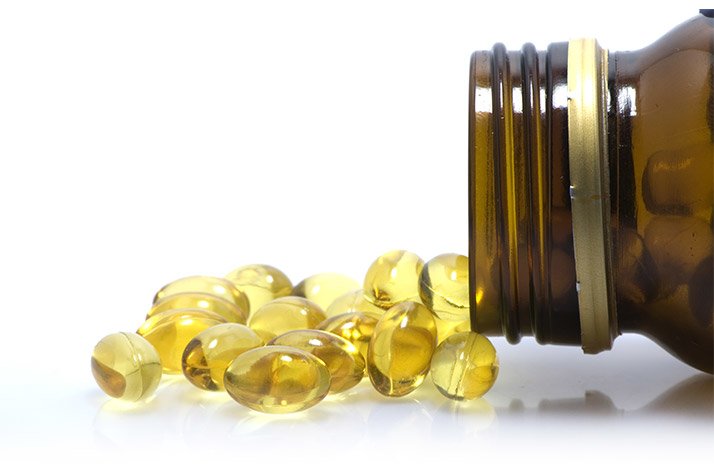
5 Supplement Must-Haves On A Budget
Discover which supplements will help maximize your gains without shrinking your wallet.
You're a student of bodybuilding, which means you know the best multijoint lifts, how many chicken breasts you should eat each day, and which supplements support muscle gains and enhance your performance in the gym.
But what if you're on a budget? What are the best ways to maximize your gains while minimizing the hit to your wallet? Here are my picks for the most effective supplements every bodybuilder should have in their stack.
Creatine
Not only can creatine help you increase muscle strength and size, it can also help you recover between sets faster. This allows you to train longer and with more intensity, ultimately leading to greater gains.1-3 Hundreds of studies support the benefits of this supplement.
Your body produces a small supply of creatine. However, if you want to maximize stores and reap the full benefits of creatine, you'll either have to eat 2-3 pounds of meat a day or take a supplement. With red meat costing $4.00 per pound in many places, you'll definitely save money by choosing the latter.

There are two common methods for maximizing creatine stores in your body. One way is to do a short-term creatine load, where you ingest 20 grams of creatine a day for 5-7 days. This is followed by a low-dose maintenance phase of 3-5 grams per day. This overconsumption helps to flood the muscle with creatine and has been shown to increase creatine pools in the muscle faster.2
If you're not in any sort of rush to maximize creatine stores, you can opt for a continuous low-dose protocol, consuming 5 grams of creatine per day. Although it'll take around four weeks to maximize creatine stores, you're less likely to experience any weight gain with a low-dose protocol.
Recommended dose: 20 grams for 5-7 days followed by 3-5 grams for maintenance
Price per serving: $0.10-$0.70
Timing: Anytime
The numerous benefits of protein include increases in muscular strength and size, decreases in body fat, and a faster recovery time. This makes it a staple in any bodybuilder's diet.
Muscle protein synthesis is an important process for increasing muscle size and strength. Resistance training alone can increase rates of protein synthesis, but it also increases rates of protein breakdown. For muscle growth to occur, you need to tip the scale in favor of protein synthesis while trying to minimize breakdown.

Research has shown that the consumption of protein post-workout can substantially increase muscle protein synthesis. Over time, this has been shown to lead to bigger gains in muscle size and strength.
If you had to choose only one type of protein to spend your hard-earned dollars on, I would recommend whey. Whey protein is a fast-digesting protein that enters the bloodstream rapidly. This allows it to get to your muscles faster and create a bigger spike in protein synthesis compared to sources such as soy or casein.4
Although protein powders will cost you about 30 cents more per serving than chicken or eggs, the portability, convenience, and lack of prep work make whey protein a must-have in any supplement stack.
You want to make that tub of protein last as long as possible. A study looking at various dosages (0, 5, 10, 20, 40 grams) found that 20 grams was enough to fully stimulate protein synthesis after resistance training.5
So dial back your post-workout shake to one scoop and make that protein last without sacrificing gains.
Recommended dose: 20 grams
Price per serving: $1.00-$1.50
Timing: Immediately after working out

Caffeine
Whether your goal is to increase energy levels at the gym or drop those last few pounds of body fat, look no further than caffeine. This thermogenic ingredient can help increase metabolic rate while also providing you with a quick source of energy during your workouts.
Along with its benefits to performance, caffeine has been shown to decrease the perception of fatigue during exercise. Muscular fatigue has been shown to decrease motor-unit recruitment within the muscle, causing a decrease in muscular-contraction strength. Taking caffeine before your workout can help sustain motor-unit firing rates and maintain maximal force output.6

Caffeine can also help you shed those extra pounds you gained while enjoying the last few days of summer. An early study showed that consuming 1.8 milligrams of caffeine per pound of body weight increased metabolic rate up to 12 percent.7 Over time, this increase in metabolic rate could help you drop an extra few pounds.
I recommend sticking to pure caffeine to see the best performance enhancements—not to mention it costs about $2 less per serving than a cup of joe from Starbucks.
Recommended dose: 150-300 milligrams
Price per serving: $0.05-$0.25
Timing: 30 minutes before working out

Whey protein is great for building muscle, but if you're not taking BCAAs, you could be leaving gains on the table. BCAAs are composed of three essential amino acids that make up almost one-third of your skeletal muscle protein, and they have been shown to stimulate muscle protein synthesis and aid in recovery.

Taken before exercise, BCAAs can reduce post-exercise muscle soreness and speed up the recovery process.8 Taken during your workouts, BCAAs can decrease protein breakdown, help spare muscle glycogen and reduce fatigue.9,10 These benefits make BCAAs essential to your next workout, especially if you train in a fasted state.
Recommended dose: 5-10 grams
Price per serving: $0.50-$1.00
Timing: Before or during your workout

Omega-3 fatty acids are one of the most important nutrients for your body. And because they are considered "essential"—meaning your body can't make its own supply—supplementing with these fatty acids is, well, essential!
Fish oils high in EPA and DHA may help to reduce post-exercise muscle soreness brought on by strenuous exercise.11 Studies have also shown less pain and swelling, and a greater range of motion following intense exercise.12 Not to mention omega-3s are also critical for building and maintaining muscles, helping you to recover faster and train harder.13

For most people, trying to consume enough fish to meet the recommended daily intake of omega-3s can be difficult to accomplish, plus it can get a bit pricey. Due to its relatively low cost—not to mention less fishy smell—supplementing with a fish oil is a practical option for most people.
Recommended dose: 1-2 grams
Price per serving: $0.20-$0.87
Timing: With meals

There are plenty of great supplements on the market, but when you're on a budget, the choices can be overwhelming. Stick to these recommended essential supplements on your next order, and watch your hard-earned dollar turn into hard-earned muscle!
*These statements have not been evaluated by the Food and Drug Administration. This product is not intended to diagnose, treat, cure or prevent any disease.
References
- Casey, A., & Greenhaff, P. L. (2000). Does dietary creatine supplementation play a role in skeletal muscle metabolism and performance? The American Journal of Clinical Nutrition, 72(2), 607s-617s.
- Volek, J. S., Duncan, N. D., Mazzetti, S. A., Staron, R. S., Putukian, M., Gomez, A. L., ... & Kraemer, W. J. (1999). Performance and muscle fiber adaptations to creatine supplementation and heavy resistance training. Medicine and Science in Sports and Exercise, 31<8), 1147-1156.
- Kreider, R. B. (2003). Effects of creatine supplementation on performance and training adaptations. Molecular and Cellular Biochemistry, 244(1-2), 89-94.
- Tang, J. E., Moore, D. R., Kujbida, G. W., Tarnopolsky, M. A., & Phillips, S. M. (2009). Ingestion of whey hydrolysate, casein, or soy protein isolate: effects on mixed muscle protein synthesis at rest and following resistance exercise in young men. Journal of Applied Physiology, 107(3), 987-992.
- Moore, D. R., Robinson, M. J., Fry, J. L., Tang, J. E., Glover, E. I., Wilkinson, S. B., ... & Phillips, S. M. (2009). Ingested protein dose response of muscle and albumin protein synthesis after resistance exercise in young men. The American Journal of Clinical Nutrition, 89(1), 161-168.
- Green, J. M., Wickwire, P. J., McLester, J. R., Gendle, S., Hudson, G., Pritchett, R. C., & Laurent, C. M. (2007). Effects of caffeine on repetitions to failure and ratings of perceived exertion during resistance training. International Journal of Sports Physiology and Performance, 2(3), 250.
- Acheson, K. J., Zahorska-Markiewicz, B., Pittet, P. H., Anantharaman, K., & Jequier, E. (1980). Caffeine and coffee: their influence on metabolic rate and substrate utilization in normal weight and obese individuals. The American Journal of Clinical Nutrition, 33(5), 989-997.
- Nosaka, K., Sacco, P., & Mawatari, K. (2006). Effects of amino acid supplementation on muscle soreness and damage. International Journal of Sport Nutrition and Exercise Metabolism, 16(6), 620.
- MacLean, D. A., Graham, T. E., & Saltin, B. (1994). Branched-chain amino acids augment ammonia metabolism while attenuating protein breakdown during exercise. American Journal of Physiology-Endocrinology And Metabolism, 267(6), E1010-E1022.
- Gualano, A. B., Bozza, T., De Campos, P. L., Roschel, H., Costa, A. D. S., Marquezi, M. L., ... & Junior, A. H. L. (2011). Branched-chain amino acids supplementation enhances exercise capacity and lipid oxidation during endurance exercise after muscle glycogen depletion. The Journal of Sports Medicine and Physical Fitness, 51(1), 82-88.
- Tartibian, B., Maleki, B. H., & Abbasi, A. (2009). The effects of ingestion of omega-3 fatty acids on perceived pain and external symptoms of delayed onset muscle soreness in untrained men. Clinical Journal of Sport Medicine, 19(2), 115-119.
- Jouris, K. B., McDaniel, J. L., & Weiss, E. P. (2011). The effect of omega-3 fatty acid supplementation on the inflammatory response to eccentric strength exercise. Journal of Sports Science & Medicine, 10(3), 432.
- Smith, G. I., Atherton, P., Reeds, D. N., Mohammed, B. S., Rankin, D., Rennie, M. J., & Mittendorfer, B. (2011). Omega-3 polyunsaturated fatty acids augment the muscle protein anabolic response to hyperinsulinaemia-hyperaminoacidaemia in healthy young and middle-aged men and women. Clinical Science, 121(6), 267-278.
